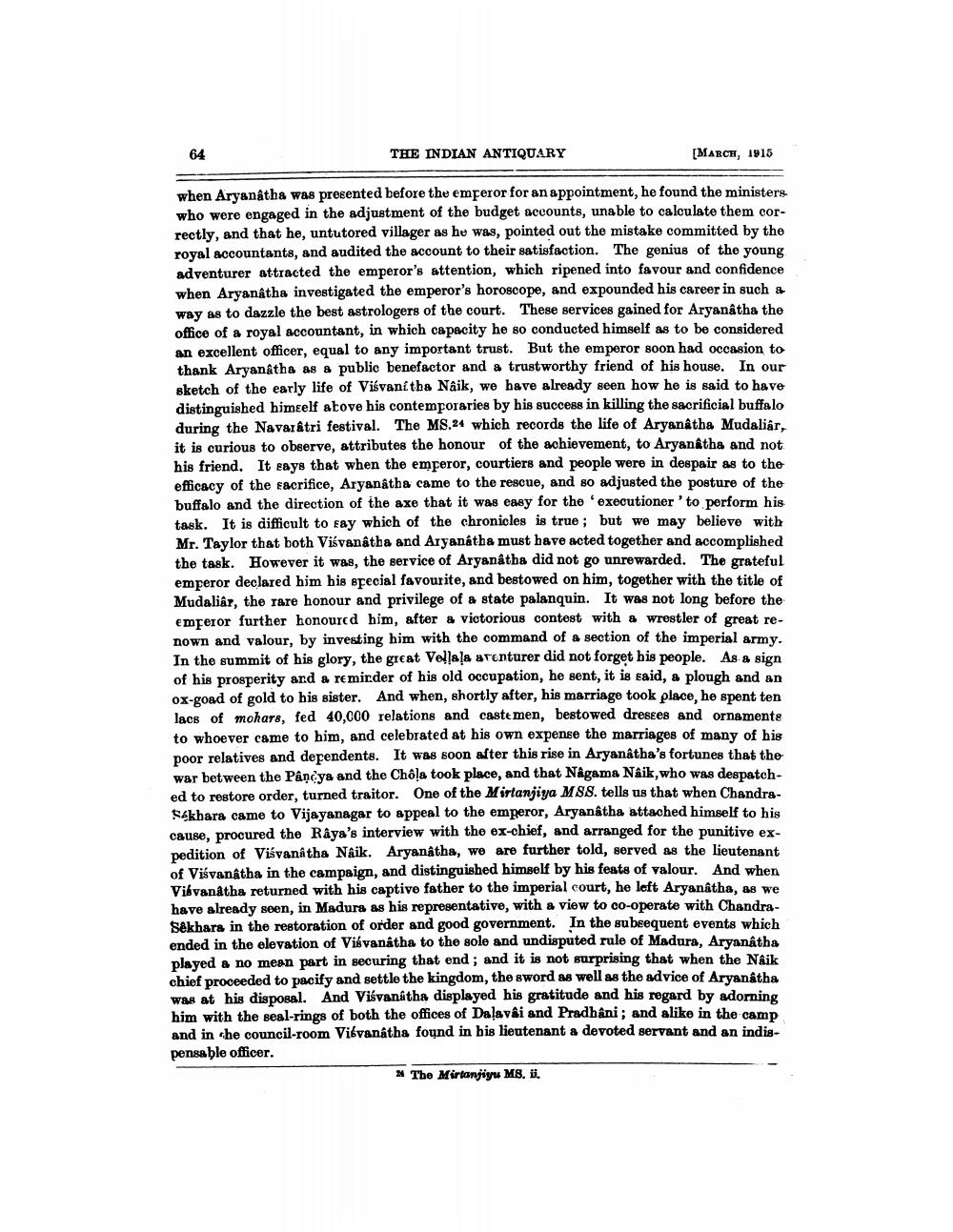________________
64
THE INDIAN ANTIQUARY
[MARCH, 1915
when Aryanatha was presented before the emperor for an appointment, he found the ministers. who were engaged in the adjustment of the budget accounts, unable to calculate them correctly, and that he, untutored villager as he was, pointed out the mistake committed by the royal accountants, and audited the account to their satisfaction. The genius of the young adventurer attracted the emperor's attention, which ripened into favour and confidence when Aryanâtha investigated the emperor's horoscope, and expounded his career in such a way as to dazzle the best astrologers of the court. These services gained for Aryanâtha the office of a royal accountant, in which capacity he so conducted himself as to be considered an excellent officer, equal to any important trust. But the emperor soon had occasion to thank Aryanatha as a public benefactor and a trustworthy friend of his house. In our sketch of the early life of Viśvanitha Naik, we have already seen how he is said to have distinguished himself above his contemporaries by his success in killing the sacrificial buffalo during the Navaratri festival. The MS.24 which records the life of Aryanatha Mudaliar, it is curious to observe, attributes the honour of the achievement, to Aryanatha and not. his friend. It says that when the emperor, courtiers and people were in despair as to the efficacy of the sacrifice, Aryanâtha came to the rescue, and so adjusted the posture of the buffalo and the direction of the axe that it was easy for the 'executioner ' to perform his task. It is difficult to say which of the chronicles is true; but we may believe with Mr. Taylor that both Viśvanâtha and Aryanatha must have acted together and accomplished the task. However it was, the service of Aryanâtha did not go unrewarded. The grateful emperor declared him his special favourite, and bestowed on him, together with the title of Mudaliar, the rare honour and privilege of a state palanquin. It was not long before the emperor further honoured him, after a victorious contest with a wrestler of great renown and valour, by investing him with the command of a section of the imperial army. In the summit of his glory, the great Vellala aventurer did not forget his people. As a sign of his prosperity and a reminder of his old occupation, he sent, it is said, a plough and an ox-goad of gold to his sister. And when, shortly after, his marriage took place, he spent ten lacs of mohars, fed 40,000 relations and caste men, bestowed dresses and ornaments to whoever came to him, and celebrated at his own expense the marriages of many of his poor relatives and dependents. It was soon after this rise in Aryanâtha's fortunes that the war between the Pâncya and the Chôla took place, and that Nagama Naik, who was despatched to restore order, turned traitor. One of the Mirtanjiya MSS. tells us that when ChandraSékhara came to Vijayanagar to appeal to the emperor, Aryanâtha attached himself to his cause, procured the Râya's interview with the ex-chief, and arranged for the punitive expedition of Viśvanatha Nâik. Aryanatha, we are further told, served as the lieutenant of Viśvanatha in the campaign, and distinguished himself by his feats of valour. And when Viśvanatha returned with his captive father to the imperial court, he left Aryanâtha, as we have already seen, in Madura as his representative, with a view to co-operate with ChandraSekhara in the restoration of order and good government. In the subsequent events which ended in the elevation of Viśvanatha to the sole and undisputed rule of Madura, Aryanâtha played a no mean part in securing that end; and it is not surprising that when the Nâik chief proceeded to pacify and settle the kingdom, the sword as well as the advice of Aryanatha was at his disposal. And Viśvanatha displayed his gratitude and his regard by adorning him with the seal-rings of both the offices of Dalavâi and Pradhâni; and alike in the camp and in the council-room Viśvanâtha found in his lieutenant a devoted servant and an indispensable officer.
The Mirtanjiyu MS. ii.




